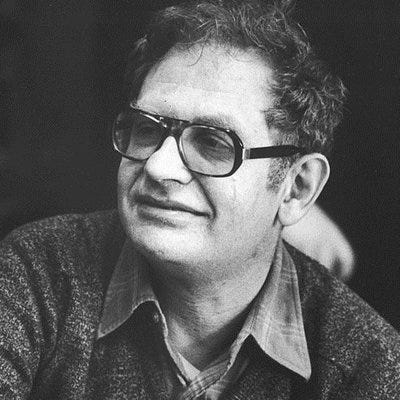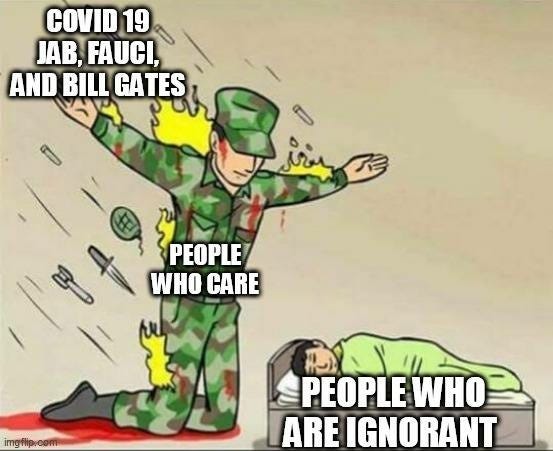On the Moral Fortitude of PureBloods
"He who makes himself a worm cannot complain afterwards that he gets stepped on." - Emmanuel Kant, Metaphysics of Morals
No matter how punishing the psyops got during the height of the Covid hoax - back when society was being crushed beneath lockdowns and the cruel absurdity of mask mandates, looming medical apartheid and the threat of forced vaccinations - arguably the deepest and most enduring scar remains the trauma of witnessing the quite monstrous transformation which gripped almost everyone around us.
The reader no doubt gets what I am referring to. Whether it was your once mild-mannered sister’s reincarnation as a double-masked, quadrupled-jabbed spokeszealot for Big Pharma, or whether it was the horrifying relish with which your buddies recounted the demise of another alleged “anti-vaxxer”, the reality which Covid forced us to confront was that, upon the say-so of some self-anointed authority figures, huge segments of western civilization can be instantly and enthusiastically weaponized against the rest of it.
Needless to say, this is no easy pill to swallow. After all, while most people rationally understood, prior to the events of 2020, that a majority of historical atrocities were committed by perfectly ordinary people, human nature is such that many harbored the secret conceit that mankind had somehow outgrown such blatant divide-and-conquer tactics. It was a conceit obliterated in the most comprehensive manner imaginable, and yet, having had someone on Gab recently alert me to Kohlberg’s Theory of Moral Development - long held to be the standard psychological measurement of a child’s moral reasoning - I have found myself, if not exactly able to forgive our Covid-crazed loved ones, then at least willing to consider their grotesque metamorphosis in slightly more clinical terms.
The Basis of Kohlberg’s Theory
Lawrence Kohlberg, a Jewish-American Psychologist and illustrious Harvard professor, first began organizing his ideas on children’s moral maturation in response to the work of Jean Piaget, whose two-stage model then represented the accepted authority on the matter. It was claimed by the French academic that, sometime around ten-years-old, behaviorally normal youngsters experience a seismic breakthrough in how they analyze their world. While younger children look at rules as fixed and based on repercussions, Piaget’s older subjects were considerably more sophisticated, the rightness or wrongness of an action judged on the intent which inspired it.
Kohlberg, however, considered Piaget’s model incomplete. Given that one’s intellectual growth does not stop at such a tender age, neither he contended could moral development – the capacity for abstract thought (which generally improves with time) enabling a person to ponder evermore intricate ethical complexities.
Kohlberg’s Research Methods
Adopting a similar approach to that of Piaget, Kohlberg interviewed groups of 72 boys aged either 10, 13 or 16, all of whom were from suburban Chicago. Each testee was presented with a series of morally ambiguous scenarios and asked to give their opinion on the most virtuous course of action. Kohlberg was in no way interested in their answers. Instead, what the psychologist wanted to know was the rationale which informed them, the most famous of his hypothetical quandaries known as ‘The Heinz Dilemma’:
“In Europe, a woman was near death from a special kind of cancer. There was one drug that the doctors thought might save her… The druggist was charging ten times what the drug cost him to make. The sick woman’s husband, Heinz, went to everyone he knew to borrow the money, but he could only get together about… half of what it cost. He told the druggist that his wife was dying and asked him to sell it cheaper or let him pay later. But the druggist said: ‘No, I discovered the drug and I’m going to make money from it.’ So Heinz got desperate and broke into the man’s store to steal the drug for his wife.”
After explaining the story to his participants, Kohlberg would then quiz them on whether or not they felt the husband’s crime was justified. From here, the boys’ answers were expanded upon via a series of supplemental questions designed to discern how they reached their conclusions. The resulting data was enough to convince Kohlberg that, in addition to the two levels of moral reasoning proposed by Piaget, there also existed a third, each of these further subdivided into two stages which individuals move through sequentially over the course of their life.
How the Theory Applies to the Scamdemic
Although it might at times feel as though those of us alive today have been fated to suffer through the stupidest, most cattle-brained chapter in human history – and looking back on it, the Covid era seems increasingly deserving of the title – even this unprecedented species-wide spaz-out remains well within the parameters of expected psychology. Throughout this article, I hope to illustrate just how society’s varying reactions, not to any virus, but rather to the flagrant corruptions and injustices it facilitated, has gone some way toward proving the essential truth of Kohlberg’s claims. Understand, I am in no way asserting that morality was the only factor at play. Fear, ignorance, incuriosity, shallowness of thought, servility both the instinctive and the learned, all helped ensure that vast swathes of the population walked unquestioningly, often even eagerly, into the jaws of their own enslavement. Nevertheless, as the initial hysteria died down and the theatre of health protocol became normalized, it seems pretty self-evident that so too did the full strata of ethical reasoning start to reveal itself:
Level 1: Preconventional Morality
The lowest level of development is typically attained while still in early childhood and should be outgrown by the time an individual is just nine-years-old. At this point, children have not yet internalized any form of moral standards but instead rely on rules being imposed by outside forces, the range of acceptable behavior determined solely by the consequences of transgressing them.
Stage 1: Punishment and Obedience Orientation.
It seems all but redundant to point out the role coercion played in enforcing Covid tyranny. From the shameless thuggery of Macron’s minions to the honest-to-God detainment camps in Australia, from the naked despotism of Justin Trudeau to the social credit system tightening its grip around China, not even the most diligent of mask-wearers can reasonably deny the authoritarianism which has been ushered in under the auspices of ‘public health.’
But regardless of how terrifying it might have been to watch the governments of self-styled liberal democracies sic the dogs on their own citizens, for most people, compliance with the Covid doctrine and the Holy Ordinances of The Experts was ensured through nothing more than fear of public rebuke. Certainly, as anyone who made it through the last two years unmasked and unjabbed will know, this was no mean feat, the ubiquitous finger-wagging and nagging admonishments starkly reminiscent of schoolkids ratting on their less compliant classmates.
Stage 2: Individualism and Exchange.
As a child grows and they come to realize that a range of opinions exists within society, they also begin to act out of self-interest. Of course, officially speaking, the only opinions permissible in regard to Covid were those assigned by the state, and yet as the psychological assault wore on, more people started to notice, albeit quietly, the gaping inconsistencies in what the three-letter bullshit artists were telling them.
Many continued to adhere anyway. Of all the inexplicable behaviors we’ve observed since March 2020, there has perhaps been none more legitimately unfathomable – not to mention, more legitimately contemptible – than those who sought to turn tyranny to their advantage. This might have meant pulling on a mask for street cred. Plenty of others used Covid disruptions as cover for their own professional incompetence. Some moral midgets even took the shot in exchange for donuts, marijuana, and prostitutes, while Satan must surely have a special place in hell for those who, thinking only of a plump government paycheck, willingly signed up to perpetuate the insanity.
Level 2: Conventional Morality
As might be assumed from the title, a majority of adolescents and even adults fall into the middle level Kohlberg dubbed ‘Conventional Morality.’ By now, people have (to differing degrees) absorbed the ethical framework of the society around them but do not yet question that framework on a more foundational basis.
Stage 3: Good Interpersonal Relationships.
There are doubtless some readers who recall, back during the earliest days of the power grab, that sinking sensation the first time they heard the MSM link dissidents with murder. “Granny killers” was perhaps their most regurgitated epithet. This, like all other such accusations, was merely an extension of the fiction that anyone who did not bend to the WHO’s fatuous edicts was somehow jeopardizing the safety of everyone around them and was therefore deserving of ostracism if not full-blown pariah status.
Such propaganda was a direct appeal to those who occupy stage three on Kohlberg’s scale. While a bulk of these people accepted without question the central tenants of the Covid dogma, their primary motivation for performing the accompanying choreography was actually the approval of the rest of the population. By dutifully following arrows around a supermarket or by pointedly circumnavigating a fellow pedestrian, they were attempting to signal their loyalty to the group, many acclaim-seeking Covidians still donning a face-diaper long after their masters stopped telling them to do so.
Stage 4: Maintaining the Social Order.
For most adults, the desire to be part of society will eventually blossom into a sincere respect for it, even if they fail to think more deeply about that society’s moral underpinnings.
In a sense, it was these people who were most infuriating of all. Sure, no Covid dissenter ever enjoyed being accosted by some poor, panic-stricken pensioner, but I think most readers would agree that there was something particularly odious about the waiter who cited ‘company policy’ as they kicked you out of their restaurant or worse still, the teacher who, aware of both the futility of masks and the virus’s non-existent threat to children, dutifully enacted the CDC-certified debasement of their students. Naturally, there was a myriad of reasons behind this abject cowardice, but perhaps the most charitable interpretation is that these folks were simply acting out of an unthinking faith in the benevolence of the system, never once considering – or even just looking around to observe – the patent reality that those they were serving are corrupt and immoral to the core.
Level 3: Postconventional Morality
By Kohlberg’s estimations, only about 10-15% of the population possess the potential of reaching the third and highest level of moral development due to the abstract reasoning it requires. For those who do make this leap, their sense of right and wrong now emanates from a set of self-established principles they have arrived at through careful and prolonged consideration.
Stage 5: Social Contract and Individual Rights.
In effect, those few who manage to transcend conventional morality have cultivated enough insight to ask, “what makes society good?” By now, individuals recognize not just that there is a multiplicity of opinions, but a multiplicity of very valid opinions - the correct answer often being difficult to distinguish.
For such people, the opening acts of the global coup was a time of intense inner conflict. Understand, I am well aware that there existed plenty who saw through the farce from the get-go, yet for most of us, the fundamental lie of a rampaging virus constituted a bleak and terrible reality. In the face of this purported danger, those who had attained this stage of moral development accepted that certain measures needed to be taken, yet remained deeply torn by the manifest wrongness of what those measures were. Indeed, it is quite possible that the breakdown of the official narrative has forced many of these individuals to recognize the limit of even this rarely achieved ethical code, perhaps prompting a few to ask the yet more revelatory question: “What makes anything good?”
Stage 6: Universal Principles.
As Kohlberg’s research demonstrated, scarcely a small sliver of the population ever experiences the highest stage of moral development - a point at which principles such as justice, liberty, and the sovereignty of the individual take precedence over the ever-amorphous and often-exploited notion of ‘the common good.’
Suffice to say, such grit was shown to be in perilously short supply during the plandemic years. Most of us can probably remember - or perhaps can even count yourself amongst - the seemingly infinitesimal few who fought immediately and courageously against all suggestion of lockdown. They did this not because they necessarily saw through The Science™. Most did not yet appreciate the real agenda being carried out under cover of Covid. Rather, what they were refusing to go along with, was the evil of imprisoning people who had committed no crime, the barbarism of muzzling children, and the still unfolding calamity of forcing citizens to take an unwanted, untested, provably dangerous and demonstrably ineffective “vaccine.” It was these convictions which fortified them through the most intense psychological operation ever conducted; through ridicule, isolation, and persecution; through the loss of friends, the poisoning of relationships, and often mental and emotional anguish just so they might continue to live in accordance with that which they knew to be right.
Why any of this Matters…
It is of course tempting for those of us who got through the last two years brutalized but with our DNA still intact, to claim for ourselves a spot in the upper echelons of Kohlberg’s Scale of Moral Development. And while, broadly speaking, I regard this claim to be justified, neither was this article written to convey PureBloods as some kind of ethical Übermensch. Don’t get me wrong, given the venom we’ve been subjected to since this whole debacle began, it’s pretty clear that the vaccinated have some profound assholes within their ranks, but in reality, Kohlberg never intended his system to gauge anyone’s inherent moral worth. On the other hand, what he was attempting to quantify was the depth and soundness of the reasoning which scaffolds it, in essence measuring an individual’s capacity to translate whatever virtuous instincts they have – a capacity which might easily be worked on - into a more consistent, more coherent, and ultimately more sustainable worldview.
The establishment knows this as well as anyone. In much the same way they bombarded us with fear to dampen our appetite for freedom, and just as how they intend to cut our food supply in order to force us into a world of GMOs and digital IDs, so too do the middle managers of The Great Reset seek to reduce the rest of humanity into an ethically-enfeebled, morally-malnourished underclass. In this sorry state, they hope we will be desperate enough to devour whatever government-diktats-dressed-up-as-noble-crusades they churn out of their propaganda mills, and sadly, as evidenced by society’s wholesale conversion to Scientism, this assumption has proved depressingly well-founded. Yes, Covid may have outlived its usefulness as a vehicle for mass enslavement, but since then Black Lives Matter, Ukraine, and the recently rekindled climate crisis have all had their moment as “The Current Thing.”
Deep within the recesses of power, these and other short-lived state religions are being designed and even wargamed against us, and while more people than ever have grown skeptical of these trillion dollar ad campaigns, it would be tantamount to suicide (or at least, Biden-esque levels of brain function) to not believe there were some other black swan event on the horizon. And when it comes, whether in the form of war, another pandemic, financial catastrophe, or my personal prediction, a shit sandwich of all three, we can be certain that mankind will once more be tested on the emotional, psychological, and as I have here tried to outline, even the moral level - our enemy’s techniques this time refined from experience.
*** A Quick Note to New Subscribers: I just wanted to say to anyone who’s signed up to this newsletter since I began publishing my Klaus Schwab and the Men Who Molded Him series, I will be returning to it imminently. As I’m sure you can appreciate, after five consecutive articles on the topic, I felt like I needed a temporary change of pace. Rest assured however, that I’m currently piecing together the sixth and final instalment which examines Schwab’s relationship with the man who would come to shape the WEF’s vision for our transhumanist future. ***
Crypto Donations:
Bitcoin: 1MHzr38VAc3g5cucBGiT8axXkiamSAkEkZ
Ethereum: 0x9c79B04e56Ef1B85f148CaD9F4dBD4285b2f9E69














I appreciate your analysis of the human response to the COVID story (lie), and how it must have pleased our masters (presumed masters), TPTB. While I do not expect to remember Kohlberg's hierarchy of reasoning, I suspect I will recognize it in others. Thank you very much!
Good outlook on the situation. Which has to be taken seriously if one values life and freedom.
I heard about Piaget's work from JBP. Havent heard of Kohlberg before, he seems to be right tho with his gradation. According to him I would be level 5 at the start of plandemic.
Now imagine when you start adding developed intuition to the abilities which allow for impeccable decision making. One can avoid having almost any wrong decisions, regardless of how much input one has before having to decide.